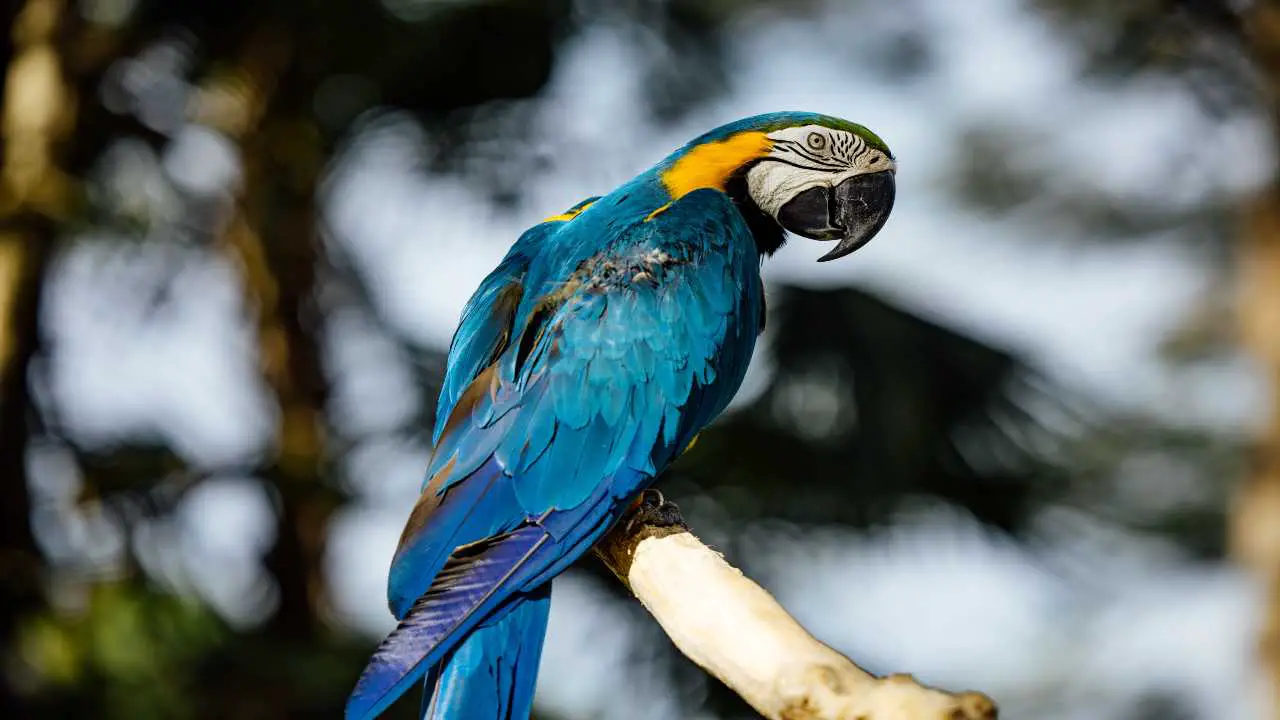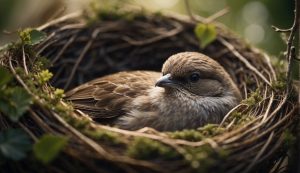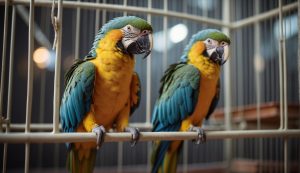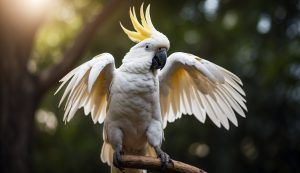Can You Put Parrots with Chickens? Tips for Keeping Different Birds Together

Parrots and chickens are both intelligent and social creatures, which makes them great pets. However, if you’re considering keeping them together, you might be wondering whether it’s safe and feasible.
In this article, we’ll explore whether parrots and chickens can live together, the potential risks, and the best practices for co-habitation.
Understanding the differences between chickens and parrots is crucial when considering whether to keep them together.
Chickens are domesticated birds that are typically raised for their meat and eggs. Parrots, on the other hand, are exotic birds that are kept as pets for their beauty, intelligence, and ability to mimic human speech.
While they may seem similar in some ways, they have different housing requirements, dietary needs, and health concerns.
Key Takeaways
- Chickens and parrots can live together, but it requires careful consideration of their housing requirements, dietary needs, and health concerns.
- Co-habitation between chickens and parrots can pose potential risks, such as the spread of diseases and aggressive behaviour.
- Proper planning and supervision are necessary for successful cohabitation between chickens and parrots.
Table of Contents
Understanding Chickens and Parrots
Chickens and parrots are two very different animals, with different behaviors and dietary needs. While they can coexist peacefully under certain circumstances, it is important to understand the nature of each animal before deciding whether to keep them together.
Chickens
Chickens are domesticated birds that are commonly kept for their meat and eggs. They are social animals that live in groups called flocks and have a hierarchical structure with a dominant rooster. Chickens are omnivorous, meaning they eat both plant and animal matter. They require a diet that is high in protein and calcium to lay eggs and maintain their health.
Parrots
Parrots are highly intelligent birds that are often kept as pets. They are social animals that form strong bonds with their owners and require regular interaction and mental stimulation. Parrots are herbivorous, meaning they eat a diet consisting primarily of fruits, vegetables, and seeds. They require a varied diet to maintain their health and avoid malnutrition.
Coexisting
While chickens and parrots can live together, it is important to take certain precautions to ensure their safety and well-being. Chickens can be aggressive towards smaller animals, so it is important to supervise their interactions and provide separate living spaces if necessary. Additionally, chickens can carry diseases that can be harmful to parrots, so it is important to keep their living areas clean and free of feces.
In conclusion, while chickens and parrots can coexist peacefully under certain circumstances, it is important to understand the nature of each animal and take precautions to ensure their safety and well-being. By providing separate living spaces and maintaining a clean environment, it is possible for these two very different animals to live together harmoniously.
Housing Requirements
If you’re considering keeping parrots and chickens together, it’s important to ensure they have adequate housing arrangements. Here are some tips to help you create a safe and comfortable space for your feathered friends.
Backyard Space
The first consideration is the size of your backyard. Depending on the number of birds you plan to keep, you will need enough space to accommodate both species. Chickens require a coop or pen, while parrots need an aviary. Make sure you have enough room for both, and that they are not overcrowded.
Chicken Coop or Aviary
Chickens and parrots have different housing requirements, so you will need to provide separate living spaces for each species. Chickens need a coop or pen that is secure and well-ventilated. The coop should be large enough to accommodate the number of chickens you plan to keep, and should have roosting bars and nesting boxes.
Parrots, on the other hand, need an aviary that is spacious and secure. The aviary should be large enough to allow your birds to fly and exercise, and should have plenty of perches, toys, and food and water dishes.
Pens and Free Range
If you plan to give your chickens some free range time, make sure they are supervised and that they do not have access to your parrot’s aviary. Chickens can be aggressive towards smaller birds, and may harm your parrots if they are allowed to interact.
In conclusion, when it comes to keeping parrots and chickens together, it’s important to ensure they have separate and adequate housing arrangements. With the right setup, your feathered friends can coexist happily and safely in your backyard.
Dietary Needs
When it comes to the dietary needs of parrots and chickens, there are some important differences to keep in mind. Parrots require a balanced diet that includes a variety of fruits, vegetables, and grains, as well as some protein. On the other hand, chickens are omnivores and require a diet that includes both plant and animal matter.
It is important to note that while parrots can eat meat, including chicken, it should be given in moderation and cooked appropriately. It is also important to remove all bones from the chicken before feeding it to your parrot. Additionally, parrots require a source of calcium in their diet, which can be provided by offering them cuttlebone or other calcium supplements.
In terms of water, both parrots and chickens require clean, fresh water at all times. It is important to change their water frequently to prevent the growth of harmful bacteria.
Overall, providing your parrot and chicken with a healthy, balanced diet is essential for their overall health and wellbeing. By offering them a variety of foods that meet their specific dietary needs, you can help ensure that they are getting all the nutrients they need to thrive.
Health Concerns
When considering housing parrots and chickens together, it’s important to be aware of the potential health risks that come with it. Here are some common diseases to be aware of, as well as ways to prevent illness and recognize symptoms.
Common Diseases
Chickens can carry a variety of diseases that can be harmful to parrots. Mycoplasma gallisepticum (MG) is a bacteria-like organism that can cause respiratory disease in chickens, and it can also infect other birds, including parrots. Other bacterial infections, such as salmonella and avian chlamydiosis, and fungal infections, such as Aspergillus, are also common.
Preventing Illness
Preventing illness is key when it comes to keeping parrots and chickens together. Here are some ways to minimize the risk of disease transmission:
- Keep parrots and chickens in separate enclosures to prevent direct contact.
- Practice good hygiene, such as washing your hands thoroughly after handling either bird.
- Quarantine any new birds before introducing them to the flock.
- Vaccinate birds against common diseases.
- Use antibiotics as directed by a veterinarian to treat any illnesses that do arise.
Recognizing Symptoms
It’s important to be able to recognize symptoms of illness in both parrots and chickens. Symptoms of respiratory disease in birds can include coughing, sneezing, wheezing, and difficulty breathing. Other signs of illness can include lethargy, loss of appetite, and changes in behavior. If you notice any of these symptoms in your birds, it’s important to seek veterinary care right away.
Overall, while parrots and chickens can live together peacefully, it’s important to take precautions to prevent the spread of disease. By practicing good hygiene and monitoring your birds for signs of illness, you can help keep both your parrots and chickens healthy.
Co-Habitation Considerations
Pros and Cons
Keeping parrots and chickens together can have both pros and cons. One advantage is that parrots and chickens are both social animals and can provide companionship for each other. They can also share the same living space, which can save on housing costs. Additionally, if you are raising chickens for their eggs or meat, having parrots around can help deter predators.
However, there are also potential drawbacks to co-habitating parrots and chickens. Parrots can be more aggressive than chickens and may bully or attack them. Chickens can also carry diseases that can be harmful to parrots. Additionally, if your parrots have a tendency to chew or peck at things, they may damage the chickens’ feathers or beaks.
Safety Measures
To ensure the safety of both birds, there are several measures you can take when co-habitating parrots and chickens. First and foremost, it is important to quarantine any new birds before introducing them to the existing flock. This can help prevent the spread of any diseases or parasites.
It is also important to practice good biosecurity measures, such as keeping the living area clean and disinfecting it regularly. Providing separate feeding and watering stations for each bird can also help prevent the spread of disease.
Another safety measure is to provide plenty of hiding spots and perches for both birds. This can help prevent bullying and aggression, as well as provide a safe place for birds to retreat to if they feel threatened.
In summary, while parrots and chickens can co-habitat together, it is important to carefully consider the pros and cons before doing so. Taking safety measures such as quarantine, biosecurity, and providing hiding spots can help ensure the safety and well-being of both birds.
Interactions with Other Birds
When it comes to keeping parrots with other birds, it is important to consider the potential for conflicts and illnesses. While some parrot species can coexist peacefully with other birds, others may be more aggressive and territorial. Here are some things to keep in mind when considering interactions between parrots and other birds:
- Wild birds: It is not recommended to allow your parrot to interact with wild birds. Wild birds can carry diseases that can be transmitted to your parrot, and they may also pose a threat to your parrot’s safety.
- Quail and turkeys: Parrots may view quail and turkeys as potential threats and may become aggressive towards them. Additionally, quail and turkeys have different dietary requirements than parrots, so it may be difficult to provide suitable food for all birds.
- Canaries and finches: These small birds may be at risk of injury or death if housed with parrots. Parrots have strong beaks and may view canaries and finches as prey.
- Cockatiels, lovebirds, and parakeets: These birds are all members of the parrot family and may be more compatible with other parrot species. However, it is important to monitor their interactions carefully to ensure that no conflicts arise.
- Guinea fowl: Guinea fowl are generally not recommended to be housed with parrots. They have different dietary requirements and may be viewed as a threat by parrots.
In general, it is important to monitor interactions between parrots and other birds closely to ensure that everyone is safe and healthy. If you are unsure about whether your parrot can coexist with another bird species, it may be best to err on the side of caution and keep them separate.
Potential Risks
While it is possible for parrots and chickens to live together peacefully, there are potential risks that need to be considered before housing them together. Here are some of the most common risks:
Aggressive Behavior
Chickens can be aggressive towards parrots, especially if they feel threatened or territorial. Chickens have sharp beaks and claws that can cause serious injury to a parrot. Additionally, parrots may become aggressive towards chickens if they feel their territory is being invaded.
Contagious Diseases
Chickens can carry a variety of diseases that can be contagious to parrots. Some of these diseases include mycoplasmosis, avian flu, salmonella, and avian chlamydiosis. Parrots can also carry diseases that can be transmitted to chickens.
Ticks
Ticks are a common problem for chickens and can also affect parrots. Ticks can carry diseases that can be harmful to both birds and humans. It is important to regularly check both birds for ticks and take appropriate measures to prevent infestations.
Hooked Beaks
Parrots have hooked beaks that are designed for cracking open nuts and seeds. While this is a natural behavior for parrots, it can be dangerous for chickens. If a parrot becomes aggressive towards a chicken, it may use its beak to injure the chicken.
Cold Weather
Chickens are able to tolerate cold weather better than parrots. If the temperature drops below 50 degrees Fahrenheit, parrots may become uncomfortable and may even suffer from hypothermia. It is important to provide both birds with appropriate shelter and heating if necessary during cold weather.
In conclusion, while parrots and chickens can live together, there are potential risks that need to be considered. It is important to take appropriate measures to prevent aggression, disease transmission, tick infestations, and injuries. Additionally, it is important to provide both birds with appropriate shelter and heating during cold weather.
Conclusion
In conclusion, while it is possible for parrots and chickens to live together peacefully, it is important to take certain precautions to ensure their health and safety.
Based on the information gathered from the search results, it is clear that chickens and parrots have different diets and lifestyles, which can make it difficult for them to coexist. Chickens are omnivorous and can be aggressive towards smaller birds, which can be a problem for parrots. However, some owners have successfully housed parrots and chickens together in a coop, which suggests that it can be done under the right circumstances.
If you are considering keeping parrots and chickens together, it is important to do your research and seek advice from experts in bird care. You should also take the necessary steps to ensure that both birds have access to appropriate food and water, as well as adequate space and shelter.
In the end, the decision to keep parrots and chickens together should be based on careful consideration and advice from professionals. With the right care and attention, it is possible for these two species to coexist peacefully and provide companionship for each other.
Frequently Asked Questions
Are parrots and chickens compatible pets?
Yes, parrots and chickens can live together peacefully as long as they are introduced properly and housed in a suitable environment.
What are some birds that can live with chickens?
Other birds that can live with chickens include ducks, geese, and turkeys. However, it is important to research the specific needs of each bird and ensure they can coexist safely.
Is it safe to keep parrots and chickens together?
While parrots and chickens can coexist, there are some risks involved. Chickens can carry diseases that can be harmful to parrots, such as Mycoplasma gallisepticum (MG).
It is important to keep both species healthy and monitor their behaviour for any signs of illness.
Can parakeets coexist with chickens?
Parakeets and chickens should not be housed together as they have different dietary and environmental needs. Additionally, parakeets may be at risk of injury from the larger chickens.
What are the risks of putting parrots with chickens?
The biggest risk of putting parrots with chickens is the potential transmission of diseases. Additionally, chickens may bully or injure the smaller parrots if they are not housed properly.
How do you introduce parrots to chickens?
Introducing parrots to chickens should be done gradually and under close supervision. Start by allowing them to see and hear each other from a safe distance, then gradually move them closer together. It is important to monitor their behaviour and separate them if any aggression occurs.











